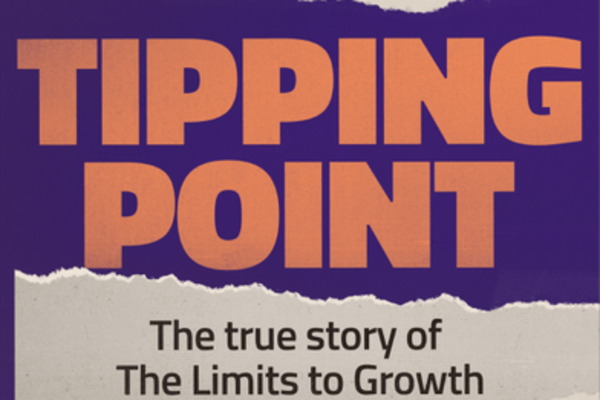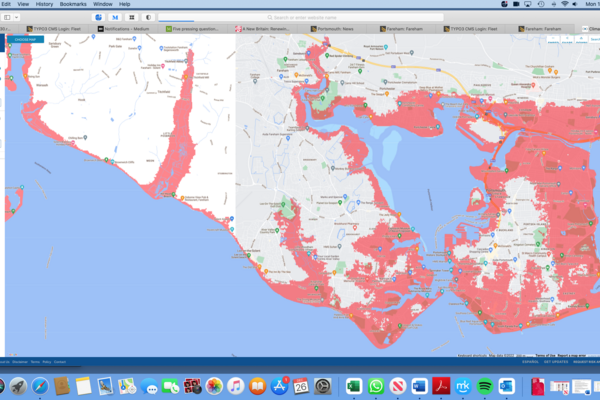
Join the Climate debate
We welcome ideas from readers on combatting Climate Change. Send us a short article - up to 250 words (with a photo, if people portrayed have given consent). Include "Climate Debate" in the subject heading, and let us know if you wish to be named as author, or prefer a pseudonym of your choice.
Limits to growth
When climate scientists talk about Tipping Points, they’re often ready to speak about some new illustration of ‘Impending Doom’: species extinction, violent weather, sea level rise, whale-threatening pollution, mass-migrations, the loss of pollinating bees, and consequential food shortages. They speak of limits beyond which we should not stray — the limits to growth.
But now Tipping Point reflects much-deeper, more-existential, questions:
· When will Climate Awareness dawn on the minds of enough governments to trigger radical action?
· When will citizen-anxiety reach such fever-pitch that it can no longer be ignored?
The Climate Change deniers are already hard at work — have been for decades — and the conspiracy theorists are well-funded. No-one relishes upheaval, the awful prospect of changing so much of our lives, our comfort, our priorities, BUT there will be a Tipping Point when we say, ‘UP WITH THIS WE MUST NOT PUT’.
The dawning of mass awareness is gathering pace — but you don’t need to believe me. Go find a quiet space and listen to the Tipping Point podcast. To take in all three episodes you’ll need a total of 2 hours — but that can be spread over today and tomorrow. The link here is to Spotify but choose your own podcast source.
Find time for Episode 1 (39 minutes) and you will reflect on how our lives have been spent missing the point and not understanding the ‘Limits to Growth’.
David Brunnen
Atacama Desert at Lib Dem Conference
Bournemouth is not a wasteland. Our conference is not a desert.
So why was the Atacama Desert in Chile on the Liberal Democrats agenda?
Simples: the Atacama Desert is the graveyard of fast fashion.
Atacama Desert is the end of the line for mountains of unwanted clothing – mountains of the planet's 'dirty washing' visible from space. Understanding the fast fashion industry illustrates:
- the waste of material,
- the vast use of water in production,
- massive pollution of rivers with micro-plastics,
- threats to the food chain and our health, and
- consequences of unconstrained consumerism,
And it highlights the perils of slave labour, poverty and pollution.
Fixing Fast Fashion was a conference session that made delegates face the awful realities of economies and communities distorted by Conservative values. Solving the Climate Crisis will not be sorted by simply Fixing Fast Fashion, but this is a great way to teach economics.
Liberal Democrats show other political parties how to lead for the good of humanity.

Good for the planet - good for business
Local businesses are the lifeblood of the money-go-round called the local economy - creating employment and serving the community.
And they can be leaders in the innovation we need to reduce our dependence on fossil fuels.
One local example is Portchester-based GEO M&E Ltd of Hamilton Road.
From a standing start as gas heating engineers they are now immersed in the world of renewables - heat pumps, solar panels and various hybrid systems now make up much of their business.
When they started out, they used a retail unit in the centre of the village but then found that showroom space was an unnecessary expense.
Before COVID the business grew to 16 employees but has now settled to a more manageable team of 11 including three apprentices. Their professional accreditation is supported by the nearby Steve Willis Training Centre.
GEO's approach underlines the value of the changes former Lib Dem leader Vince Cable introduced when he was Business Secretary during the Coalition Government, emphasising the importance of apprenticeships in building our skills base. For years the underfunding of Further Education had weakened the supply of talented technicians and skilled craft people.
With ongoing energy price upheavals and increasing awareness of climate concerns, GEO’s founder, Ed Acton, notes that customer motivations are changing. “More than half our requests are now driven by enthusiasm to cut back on fossil fuels - an easier decision now that investment pay-back times are shorter.”
The GEO team deal daily with homeowners and other small businesses. Awareness of the need to shift to renewable energy is now so high that the general public are well ahead of central government policy developers.
For additional insights into energy policy, check the research by Nesta.
Let’s beat Climate Emergency together
Fareham Council has unanimously backed a motion put forward by the Liberal Democrats to tackle the Climate Emergency.
The motion welcomed the Working Party on Climate Change set up by the Council. It asked the Working Party to take note of the following aspirations:
1. Make the Council’s activities net-zero carbon by 2030
2. Achieve 100% clean energy across the Council’s full range of functions by 2030
3. Ensure that all strategic decisions, budgets and approaches to planning decisions are in line with a shift to zero carbon by 2030.
4. Support and work with the County Council, the Partnership for South Hampshire (PfSH) and voluntary agencies towards making the entire area zero carbon within the same timescale. And convene a Citizens’ Assembly to involve the wider population in the process;
5. Request that the Council and partners take steps to proactively include young people in the process, ensuring that they have a voice in shaping the future;
6. Report on the level of investment in the fossil fuel industry that our pensions plan and other investments have, and review the Council’s investment strategy to give due consideration to climate change impacts in the investment portfolio;
7. Call on the UK Government to provide the powers, resources and help with funding to make this possible, and ask local MPs to do likewise;
8. Consider other actions that could be implemented, including (but not restricted to):
- renewable energy generation and storage;
- encouraging alternatives to private car use;
- providing electric vehicle infrastructure;
- increasing the efficiency of buildings, in particular to address fuel poverty;
- proactively using local planning powers to accelerate the delivery of net zero carbon new developments and communities.

Dig for defeat - or learn to stay alive
The decision to invest the UK’s already flaky reputation in a climate-crisis-defying coal mine has been described as “. . . an appalling decision. Approving this mine is a misguided and deeply damaging mistake that flies in the face of all the evidence. The mine isn’t needed, will add to global climate emissions, and won’t replace Russian coal.”
Alok Sharma MP no longer has a seat in the Cabinet, but no one could deny that he’s done his UN/COP homework. The decision, Sharma warned, would, “not only be a backward step for UK climate action but also damage the UK’s hard-won international reputation”. Many would now assert that reputational damage is already beyond recovery.
Leadership is often a matter of leading by example. For Parties with deep devotion to capitalist economics, the challenge is to face reality.
Many people living in my community will soon be ‘economic migrants’ seeking pastures new. Survival for our children will be even more disruptive as we’ve already squandered the hopes of keeping global temperatures below 1.5C.
The shrinkage of both land area and peace-ability will likely encourage more emigration to currently underpopulated areas of Europe, Canada, USA, Eastern Europe, Africa – or even Russia! But maybe we’ll not be economic migrants – more likely we’ll join the masses of ‘displaced people’ and asylum seekers, searching for refuge from climate catastrophes or repressive regimes.
True leadership must be honest. Priorities must be reordered. Every decision, small or large, personal, commercial, community-based or governmental, must be tested for compliance with the mass mobilisation of intellect needed in the war against planet abuse.
What would Climate Action Prioritisation mean?
The adaptation towards reprioritisation of shared public priorities above private profit will require very different leadership – not tribal responses rooted in the legacies of vested interests.
Step One must be the removal of climate policy from the political arena. We are way beyond the era of debatable opinion. To face the looming existential crisis, broad coalitions to form Climate Commissions could echo previous attempts to decouple long term infrastructure investment from the cycle of electoral politics. Certain doom provides powerful incentive, but such Commissions must have teeth and be respected – for no decisions will please everybody – and that leads directly to the second step where, collectively, we realise that we cannot act alone.
Step Two is a massive global education programme led, not by elected politicians or self-serving industries, but by science – again broad assemblies of informed researchers across all aspects of life. These assemblies must be globally decentralised and the interworking between them moderated by higher council to ensure cross fertilisation and commonality of priorities. Here there will be further frictions – but frictions that must be resolved with respect to local cultures. The driving force must be the sense of common threat and (eventually) an understanding that sovereignty is an invalid concept during a global existential crisis.
There is no Step Three. The first two steps border on the limits of civilised brainpower and all else is subservient to the over-riding priority of long-term survival.
Penny-dropping conversation-crashing
Casual Christmas chat reveals generational gulf - and floods of tears.
The parental moment of dread: the annual return of the young ones, partners, and offspring, full of new-fangled figuring and keen to press home their urgent pleas. Your normal role, Grandad, is to listen politely, rub your chin, urge moderation and question the science.
“Steady on”, no matter how deeply intoned, is never enough to quell their clamour. Apparently, we must relocate ASAP. Motivations are suspect. Downsizing releases cash, reduces cost and frees up accommodation. But no, they are not moved by financial incentives, or their own accommodation needs.
Theirs is a global perspective, but, honestly, we quite like it here.
“It stands to reason - something will be sorted. Most probably Portsmouth will be fixed first - and then, surely, we’ll be sorted over here. A quarter of a million people - almost a whole city - swamped by waves? Preposterous! They’ll never let that happen.”
“But Dad, listen. This is not just Portsmouth. Sea level rise is happening.
NO ONE IS PLANNING TO STOP IT !”
“Now you’ve made your mother cry. You listen to me. I know we planned for you to inherit the place, and you know your Mum and I won’t be around for much longer, anyway, but please, just leave us here. Forget the inheritance - it’s written off - just make sure you and the grandchildren are safe. Only your generation can plan for what might happen next. Sorry if you think we messed up, but we are out of options.”


